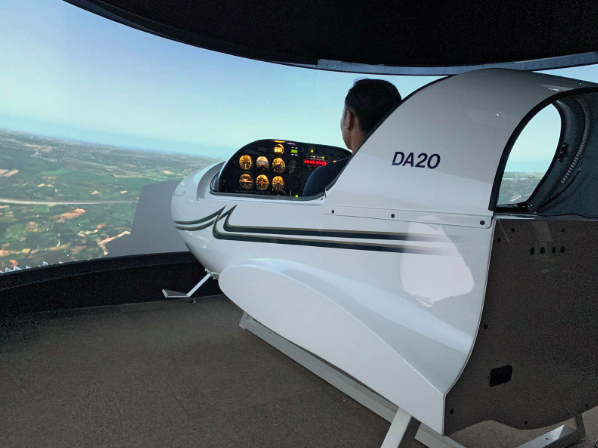
For small companies at big shows, the investment in time, money and resources only makes sense if it helps generate new business.
And for one European firm, Euramec provides a perfect example.
In December, the Belgian-based manufacturer of low-cost flight-training devices, delivered its first simulator to a customer here. The delivery capped a rapid procurement process that had begun with a chance encounter on the floor of the air show in 2018.
“We had never met them before they popped in to the booth two years ago,” says Euramec’s founder and CEO, Bert Buyle, speaking of Aeroviation, the Singaporean firm that has just installed its Diamond DA20 training device. “It took a while, because they had to get the funding done, but finally, we made it.”
Aeroviation is using the device to offer what it calls a recreational pilot certificate, enabling would-be pilots aged 15 and above to achieve basic levels of competence in a simulated cockpit before progressing on to full private-pilot training, which will take place in Australia.
“They’d set up a training center in Singapore and had a sim on lease, but they were absolutely not satisfied,” Buyle says. “So they were looking at something more professional, and decided in the end on our system. The simulator comes with full 240-degree visuals, and it’s ideal for the sort of ab-initio training they want to do. For doing the basics, especially flying circuits, you need a very good view around the aircraft, and you have that with this product. It’s very realistic.”
Euramec has been able to win business from flight schools targeting beginners by offering a high level of immersion with low procurement and operating costs. The firm can offer cockpits tailored to individual customer requirements for any aircraft that uses the Garmin G1000 avionics suite.
The firm is simultaneously branching out into bigger and more complicated programs. A loan from the Belgian government helped them finance the license for a data pack from Airbus for the A320, and their first A320 sim – installed into a recycled A320 cockpit (Euramec has an exclusive arrangement with Aerocircular, an aircraft recycler, and will be buying every A320 cockpit that becomes available) – is due for delivery later this year. The company has also delivered a Dornier 228 simulator to a customer in Africa. The breadth of the range is as important to driving new business as the quality of the products, Buyle argues.
“We’re covering a very wide range, and they’re all type-specific cockpits,” he says. “That makes us a bit unique. The other people in the market are focused on one aspect – for example, maybe they provide cockpit trainers specific to airliners, but they won’t do ab-initio training. On the other hand, you have guys trying to sell very generic products which are not based on a real cockpit, focused on basic instrument flying and basic flying skills with a universal device. We can provide solutions for every customer.”
The importance of this capability to a market growing as rapidly as the Asia-Pacific’s is clear.
“If you look at countries like Indonesia and India, where they’ve ordered a lot of aircraft, that means they’re going to have to train a lot of pilots,” Buyle says. “That means more pilots will require training all the way from ab-initio up to type rating.”
As Euramec’s experience with Aeroviation proves, air show exposure isn’t just about maintaining relationships, but about building new business.
“There are a lot of people who still don’t know us,” Buyle says. “It’s very important that we get that exposure at trade shows.”
And to do that in the Asia-Pacific market, he argues, there are few shows as potentially useful as Singapore.
“If you look at the market all the way from Pakistan to New Zealand, they’re coming to Singapore because there’s nothing else,” he says. “You have smaller shows that are specialist – every country has an air show, but it’s not on the same level of Singapore. It’s an ideal show to cover the whole region.”
